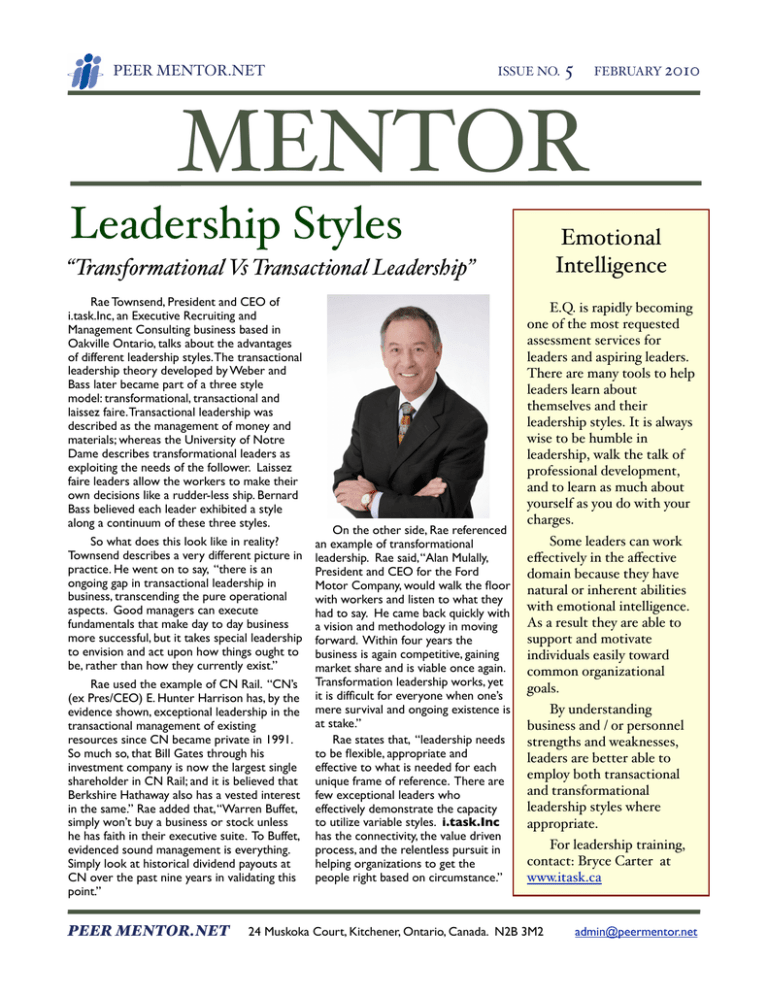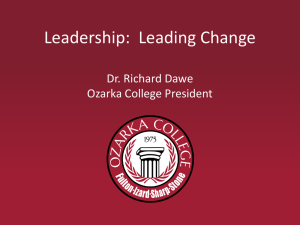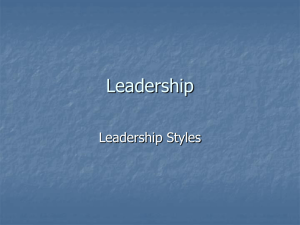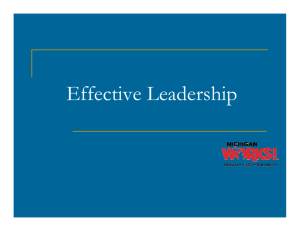MENTOR Leadership Styles “Transformational Vs Transactional Leadership”
advertisement

PEER MENTOR.NET! ISSUE NO. 5 FEBRUARY 2010 MENTOR Leadership Styles Emotional Intelligence “Transformational Vs Transactional Leadership” Rae Townsend, President and CEO of i.task.Inc, an Executive Recruiting and Management Consulting business based in Oakville Ontario, talks about the advantages of different leadership styles. The transactional leadership theory developed by Weber and Bass later became part of a three style model: transformational, transactional and laissez faire. Transactional leadership was described as the management of money and materials; whereas the University of Notre Dame describes transformational leaders as exploiting the needs of the follower. Laissez faire leaders allow the workers to make their own decisions like a rudder-less ship. Bernard Bass believed each leader exhibited a style along a continuum of these three styles. So what does this look like in reality? Townsend describes a very different picture in practice. He went on to say, “there is an ongoing gap in transactional leadership in business, transcending the pure operational aspects. Good managers can execute fundamentals that make day to day business more successful, but it takes special leadership to envision and act upon how things ought to be, rather than how they currently exist.” Rae used the example of CN Rail. “CN’s (ex Pres/CEO) E. Hunter Harrison has, by the evidence shown, exceptional leadership in the transactional management of existing resources since CN became private in 1991. So much so, that Bill Gates through his investment company is now the largest single shareholder in CN Rail; and it is believed that Berkshire Hathaway also has a vested interest in the same.” Rae added that, “Warren Buffet, simply won’t buy a business or stock unless he has faith in their executive suite. To Buffet, evidenced sound management is everything. Simply look at historical dividend payouts at CN over the past nine years in validating this point.” PEER MENTOR.NET On the other side, Rae referenced an example of transformational leadership. Rae said, “Alan Mulally, President and CEO for the Ford Motor Company, would walk the floor with workers and listen to what they had to say. He came back quickly with a vision and methodology in moving forward. Within four years the business is again competitive, gaining market share and is viable once again. Transformation leadership works, yet it is difficult for everyone when one’s mere survival and ongoing existence is at stake.” Rae states that, “leadership needs to be flexible, appropriate and effective to what is needed for each unique frame of reference. There are few exceptional leaders who effectively demonstrate the capacity to utilize variable styles. i.task.Inc has the connectivity, the value driven process, and the relentless pursuit in helping organizations to get the people right based on circumstance.” E.Q. is rapidly becoming one of the most requested assessment services for leaders and aspiring leaders. There are many tools to help leaders learn about themselves and their leadership styles. It is always wise to be humble in leadership, walk the talk of professional development, and to learn as much about yourself as you do with your charges. Some leaders can work effectively in the affective domain because they have natural or inherent abilities with emotional intelligence. As a result they are able to support and motivate individuals easily toward common organizational goals. By understanding business and / or personnel strengths and weaknesses, leaders are better able to employ both transactional and transformational leadership styles where appropriate. For leadership training, contact: Bryce Carter at www.itask.ca 24 Muskoka Court, Kitchener, Ontario, Canada. N2B 3M2 admin@peermentor.net


